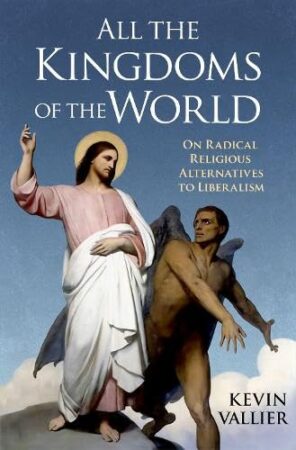All the Kingdoms of the World: On Radical Religious Alternatives to Liberalism by Kevin Vallier (Oxford, $36, 305 pages)

Version 1.0.0
Kevin Vallier has set out to reply to the integralist challenge to liberalism in his important 2023 volume, All the Kingdoms of the World. Vallier takes a dozen pages to define integralism but if it can be summarized in a sentence, Vallier states it succinctly: “integralists want the state to use its own civil law to support the enforcement of canon law or at least to avoid undermining canon law.” By canon law, Vallier is not talking only about Catholics, but any religious group that wants to impose the authority of the state on a population to ensure that authority of God is maintained. (There are chapters on Islamic and Confucian approaches to integralism.) Vallier’s intent is to defend the liberal order – democracy, freedom of speech, conscience, religion — from the unmistakably illiberal effects of integralism while noting the extreme difficulty that some hope for in returning to a past when the lines demarcating state and church were often blurred.
Vallier’s audience are modernists who accept liberalism and his strength is pointing out that liberalism lives uneasily alongside religion in part because “liberals reject the fall of man, proposing that persons are originally good and rational” as postulated by Jean-Jacques Rosseau. With its incessant belief in progress and its own goodness, “liberalism ingeniously masks its own violence and sectarianism.” By appearing to be standing “above our conflicts,” and proposing supposedly neutral procedures “that can fairly resolve social disputes,” liberalism becomes the arbiter of what is good and permissible, and consequently what is bad and impermissible. Liberalism, especially in its modern Left-Liberal form, deems itself a judge of those who judge, which is bad and impermissible outside the structure(s) of liberalism. Vallier calls for liberalism to be more tolerant of religion – in effect to be more liberal.
Vallier examines the historical integralist arguments and determines they are impractical because of a combination of the size and scope of the modern nation-state, the fact that few within the major Christian churches have any inclination to seek laws that uphold all Church teachings, and the very existence of a liberal proceduralism that will not permit religious victories in a modern democracy. At times the book is (admittedly) a response to Harvard Law professor Adrian Vermeule’s integralism and the pages sometimes gets bogged down in academic arguments, but Vallier provides an important commentary on the difficulty of achieving Christ’s Kingdom on Earth, whether via liberalism or post-liberal integralism.




